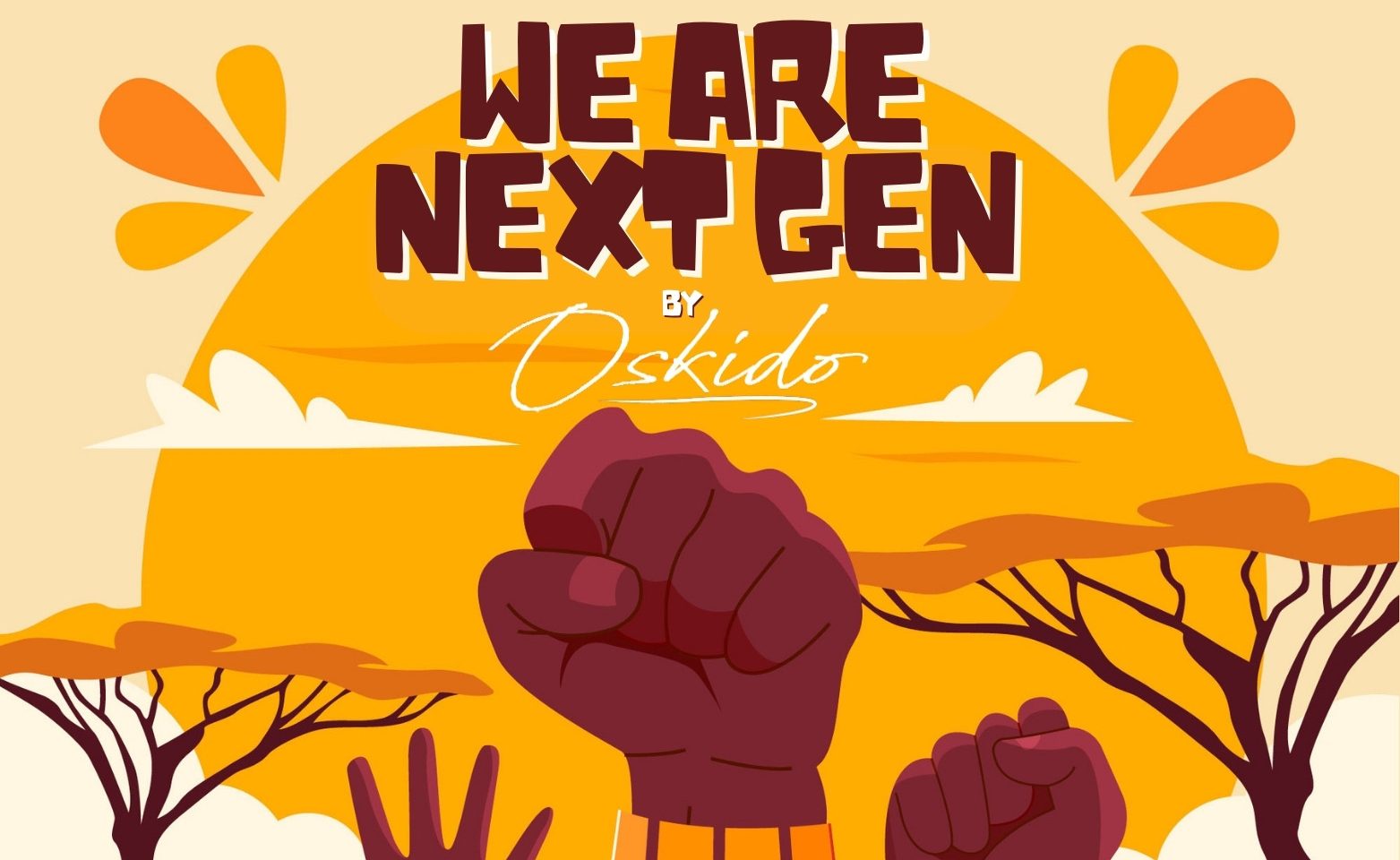Musically, Next Gen is a solid and enjoyable Amapiano album. Contextually, Oskido is a master guiding his students toward their own mastery.
By Yinoluwa Olowofoyeku
Oscar Sibonginkosi “Oskido” Mdlongwa (born 29 November 1967) is a pioneering force in South African dance music. First gaining prominence in the early 1990s as a founding member of the Brothers of Peace collective and co-founder of Kalawa Jazmee Records, he helped introduce the world to the sounds of Kwaito by blending slowed-down House beats with Jazz-inflected grooves.
For over three decades, he has remained a cultural touchstone, shaping Afro-house through his influential Church Grooves compilations and providing steadfast mentorship to younger talents through initiatives like DJU and the Southern African Music Conference. In the late 2010s, he further cemented his legacy by championing Amapiano and collaborating with its leading lights, positioning himself as a musical bridge between generations.
His long lineage spans everything from Tribal House and Gqom to Amapiano, and artistes such as Mafikizolo, Bongo Maffin, Black Coffee, DJ Tira, and DJ Maphorisa have all passed through his orbit.
Following his 2024 project, Master & The Karate Kid, and his ongoing support for emerging voices, Oskido now turns the spotlight outward with Next Gen, a 14-track, 1 hour and 34-minute album released on 6 June 2025 through We Are NextGen.
Framed as a ceremonial passing of the torch, Next Gen features many of South Africa’s brightest young talents across Amapiano, Afro-house, and Jazz-influenced dance music. With Next Gen, Oskido steps into the role of collaborator and catalyst, reaffirming his legacy as the genre’s visionary patriarch by amplifying a diverse cohort of fresh voices while maintaining his signature groove.
“Ntwana Yami” begins the album with a heartfelt, soulful piano ballad. Emotive chords and expressive playing are injected with even more sentiment through background audio samples of children playing. The song builds cinematically as sparkling keys and deep, rumbling bass are layered in, bringing the emotion to a peak. It’s a somber intro that warms the ear and opens the heart, setting the stage for the journey ahead. Yallunder and X-Wise lend their talents to elevate the intimacy.

“I Belong to You” follows with smooth, jazzy chords and a synth mallet that usher in steady house drums and rattling shakers. Progressive House blends seamlessly with Amapiano, as the arrangement blossoms every few bars with guitar solos, funky basslines, and swirling violin runs.
By the 4-minute mark, Leandra Vert enters with mesmeric vocals, soft yet insistent: “Pull me closer”, she sings in breathy tones, layering rich harmonies over groovy, airy verses. Interspersed with more violin and a final breakdown, she caps off a silky nine-minute journey that never overstays its welcome.
“Izitha” appears here in radio edit form, but its full richness is explored in the club mix on disc two. Warm synth chords, rattling percussion, and a funky bass guitar create a mellow, pulsing atmosphere. As vocals creep in, new synth basses and rolling snares build the sonic texture without disrupting the song’s tranquil energy. The mellowness is amplified by Leandra Vert’s angelic, traditional-tinged vocals, while ethereal, ambient-leaning mixing keeps the entire piece light and spiritual.
“Mpulele”, with Kamoh Xaba and Mashudu, is another radio edit that finds fuller exploration in its club version. Here, the focus is on incessant hi-hats, tonal percussion, synth basses, and electric piano chords. A rich tenor vocal leads the way with agile melodies and bright clarity, while the female counterpart enters breezily with more intricate runs and syncopated phrasing, providing a sweet sonic contrast. While the instrumental progression is minimal, the vocals carry the day, keeping listeners swaying with ease.
“Nakupenda”, which also appears as the final club mix, presents percussion-driven Amapiano drums over a synth arpeggio loop and rhythmic guitar chords. A warm bass guitar grounds the track while lyrical rhythm guitars set the melodic tone.
As synth stabs trickle in, Nobuhle delivers a powerful, broad vocal performance. Log drums bolster her chorus, joined by spiritual backing vocals and mallet runs. LA-AK’s male vocals provide balance with bright counter-melodies. The track aims for grandeur and mostly succeeds, though a slightly bolder mix of her vocals might have sealed it fully. Still, it’s a minor quibble in an otherwise moving track.
“Iminyaka” goes full house with four-to-the-floor kicks, sizzling hi-hats, and subtle claps. Major electric piano chords are paired with bright pads and a thumping bass synth before heartfelt belted vocals and rich group ululations lift the energy. The song builds with vocal layers and then drops into a filtered breakdown. A final build leads to a new chord progression, powerful soprano ad-libs, and a refined climax that brings it all home with resonance and grace.

“Amagama” appears as the final radio edit, with its fuller version included as the third club mix. Percussion-heavy Amapiano drums lay the foundation beneath sweeping pads and a soaring violin solo. Nobuhle returns to deliver rich, emotive vocals and full choral harmonies.
While beautifully performed, the track lacks the dynamic progression of earlier entries, and its extended runtime is more felt in the club version. In the context of Next Gen, it becomes one of the less memorable tracks, not for lack of quality, but because of the strength of what precedes it.
“Muntu Wam” leans closer to House than Amapiano, with percussion-heavy drums marked by a fun double clap that gives the groove its bounce. Warbled chords combine with a deep synth bass and light electronic accents to underscore Leandra Vert’s breathy, spacious vocals. The song exudes an electronic lounge energy, and even as it builds with layered vocals, arpeggios, and additional synths, it maintains a relaxed and chilled-out feel.
“Khoma” is largely instrumental, driven by thumping kicks, a straightforward drum arrangement, gritty synths, and subtle electric guitars. The progression lies in the intricate layering of snares and log drums, while MC-esque spoken segments and vocal chops modulate the energy throughout. It’s a textural piece that feels like a peak-hour groove, built for movement rather than narrative.
“Joy Ride” closes Next Gen out with a return to the ambient joy of children’s laughter, layered over a minor two-chord progression and straightforward drums. A playful bass guitar enters with buzzing synths and expressive piano improvisation. As the harmony evolves, a bright saxophone steps in for a lyrical solo, playing call-and-response with the bass.
A climax builds behind spacey, organ-like electric pianos and violin accents, before everything winds down with elegant smoothness. A fitting finale that sends the album off with warmth and wonder.
Musically, Next Gen is a solid and enjoyable Amapiano album. The inclusion of the radio edits in the main disc sequence creates a smart balance between the longer, sprawling tracks and the shorter, punchier ones, lending variation and reprieve across the tracklist. The club mixes on disc two are a generous bonus for those hungry for more, extending the sonic world of the project without diluting its essence.
Though firmly rooted in House and Amapiano, each song on Next Gen arrives with distinct energies, textures, and emotional intentions, ensuring that genre singularity never translates to stylistic sameness.

The host of featured talents injects the project with enough diversity and personality to keep things fresh, both vocally and in production. The production is strong throughout most of Next Gen, save for a few moments where the progression stalls slightly. The same goes for the engineering, which, aside from minor gripes, is largely stellar and aligned with the songs’ emotional and structural intentions.
The vocalists bring their A-game in both technique and delivery. Power where needed, softness where required, breathy for effect, belted for emphasis—the singing is effective and elevating across the project. The album flows smoothly as a listening experience, offering moments for casual swaying and occasional emotional elevation.
Oskido’s experience in crafting music is evident in the focus and clarity that each track and collaboration exhibits. And that is where Next Gen shines the most—not merely in its musicality, but in its context. Oskido is a master guiding his students toward their own mastery, hands-on enough to impart wisdom, but hands-off enough to let their own wings catch the air and take flight. Here’s hoping his already vast net of influence continues to expand as he lifts even more young talent into the spotlight.
Lyricism – 1.4
Tracklisting – 1.3
Sound Engineering – 1.5
Vocalisation – 1.7
Listening Experience – 1.3
Rating – 7.2/10
Yinoluwa “Yinoluu” Olowofoyeku is a multi-disciplinary artist and creative who finds expression in various media. His music can be found across all platforms and he welcomes interaction on his social media @Yinoluu.



